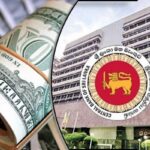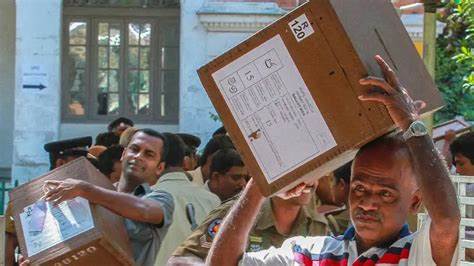
Wide Angle Zoom on NPP’s Political and Economic Pressures Ahead of Local Election
- CNL Reporter
- April 7, 2025
- Weekly Political Review
- Weekly Political review
- 0 Comments
Weekly Political Review
Sri Lanka’s Political Tightrope: Economic Struggles, Diplomatic Wins, and Internal Challenges
By Rohana Jith
President Anura Kumara Dissanayake’s government is currently walking a delicate balance, with rays of hope and looming shadows casting over the political landscape.
The upcoming local council elections have put the administration on edge, with political maneuvering intensifying.
The government is pushing hard to garner public support, but with opposition parties in disarray, particularly the Samagi Jana Balavegaya (SJB), which is struggling with internal disorganization, the task is relatively easier.
A recent meeting convened by SJB leader Sajith Premadasa saw only 16 attendees, highlighting the party’s lack of engagement, and its ability to challenge the ruling government is questionable.
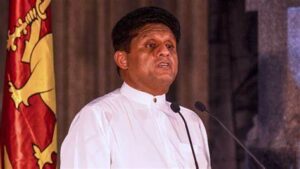
While domestic political challenges persist, there are some diplomatic successes that offer hope. One notable win for the government was the recent visit of Indian Prime Minister Narendra Modi, which further solidified the relationship between Sri Lanka and India.
The visit, marked by symbolic visits to sacred sites and a new defence cooperation agreement, notably in the Indian Ocean, signaled a strengthened alliance. Security for the visit was unprecedented, emphasizing the significance of the diplomatic relationship. However, the country’s economic outlook remains grim, primarily due to external factors.
On the economic front, Sri Lanka faces a dire situation after the United States imposed a staggering 44% tariff on Sri Lankan exports, especially targeting the apparel industry.
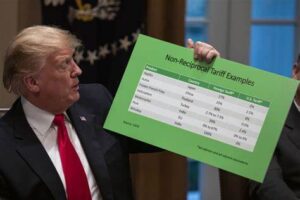
This tariff, part of President Donald Trump’s global trade policy, has left Sri Lanka vulnerable, as it loses duty-free access to more than 3,400 products under the Generalized System of Preferences (GSP). The retaliatory nature of the tariff has hurt the country’s trade standing and placed immense pressure on the economy.
The apparel sector, a key industry for Sri Lanka, faces significant challenges. Countries like Bangladesh, India, and the Philippines now enjoy lower tariffs, making them more competitive than Sri Lanka in global markets.
As a result, the Sri Lankan government must find new strategies, such as exploring alternative markets in Africa and the Middle East, pivoting to high-value niches like sustainable fashion, and lobbying for regional trade agreements.
There is also a need for domestic improvements, such as supply chain optimization, automation, and vertical integration, to remain viable in the global trade environment.
The U.S. tariffs arrive at a time when President Dissanayake is actively campaigning for the local elections, making his leadership and economic policies subject to intense scrutiny. Dissanayake, who has previously emphasized his government’s efforts to steer the country out of bankruptcy, now faces heightened pressure. He highlights the country’s recovery from bankruptcy, underlining the government’s success in stabilizing the economy after Sri Lanka defaulted on loans, struggled to import fuel, and saw an exodus of professionals.
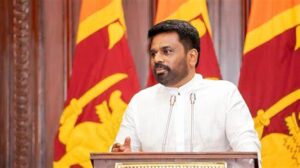
Despite these claims of recovery, critics argue that the government’s policies may not be enough to weather the impact of global trade shifts. While Dissanayake has credited past leadership, especially under Ranil Wickremesinghe’s IMF bailout negotiations, his administration is under intense pressure to maintain the fragile economic stability. The looming question remains whether the administration can adapt to the new global trade dynamics or succumb to them.
The ongoing political environment has been marked by both internal and external challenges. Domestically, legal actions against corrupt individuals have garnered attention. Dissanayake recently highlighted legal actions against former President Gotabaya Rajapaksa, linking him to allegations of luxury properties with state connections.
Additionally, corruption investigations continue, with individuals like Kapila Chandrasena, the former CEO of SriLankan Airlines, facing serious allegations of bribery in aircraft deals, though he has remained defiant in his actions.
These corruption issues are compounded by new revelations of ongoing investigations into figures like Chamara Sampath Dassanayake, a member of the New Democratic Front, and S.M. Ranjith, a former Chief Minister, who were recently sentenced for corruption. As scandals continue to surface, the public’s trust in the political system is eroding, and there is increasing frustration with the lack of accountability.
Amid these internal struggles, one of the most sensitive issues remains the investigation into the 2019 Easter Sunday bombings. The government has faced pressure from the Catholic Church to expedite the inquiry, with Cardinal Malcolm Ranjith demanding answers and threatening protests if the investigation does not move forward. Dissanayake has pledged that the investigation will be thorough and will reveal the masterminds behind the attack, including the alleged conspiracy linked to former President Gotabaya Rajapaksa.
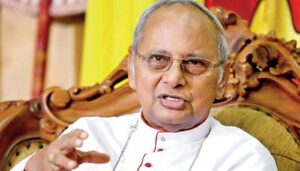
The government is also grappling with revelations surrounding key figures involved in the Easter Sunday attacks, such as the former leader of the Tamil Tigers, Pillayan, and the alleged connection to Sri Lanka’s political elite. These findings, although still under investigation, point to deep political maneuvering and suggest that the attack was part of a larger conspiracy to bring certain political figures back to power.
As the country navigates these complex issues, public confidence remains fragile. The government’s efforts to push forward with legal action against corruption and expedite the investigation into the Easter Sunday bombings may provide some political capital, but they must demonstrate genuine accountability and results to restore public trust.
On the electoral front, Dissanayake’s campaign for the local elections hinges on his ability to appeal to voters disillusioned by corruption and economic challenges. The government must demonstrate that it can deliver on promises of economic stability and social justice, particularly in light of rising discontent with the current state of affairs. The Catholic Church’s involvement and the ongoing Easter Sunday inquiry could play a critical role in influencing voter sentiment, especially among those who are seeking justice for the tragic events of 2019.
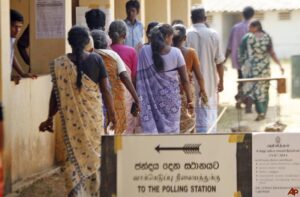
In conclusion, President Dissanayake’s administration is at a crossroads. While diplomatic achievements like Modi’s visit provide optimism, the economic and political challenges facing the country cannot be ignored.
The looming impact of U.S. tariffs, coupled with internal corruption scandals and unresolved issues like the Easter Sunday bombings, presents significant hurdles. How the government navigates these challenges in the coming months will determine its political future and the long-term stability of the nation.
